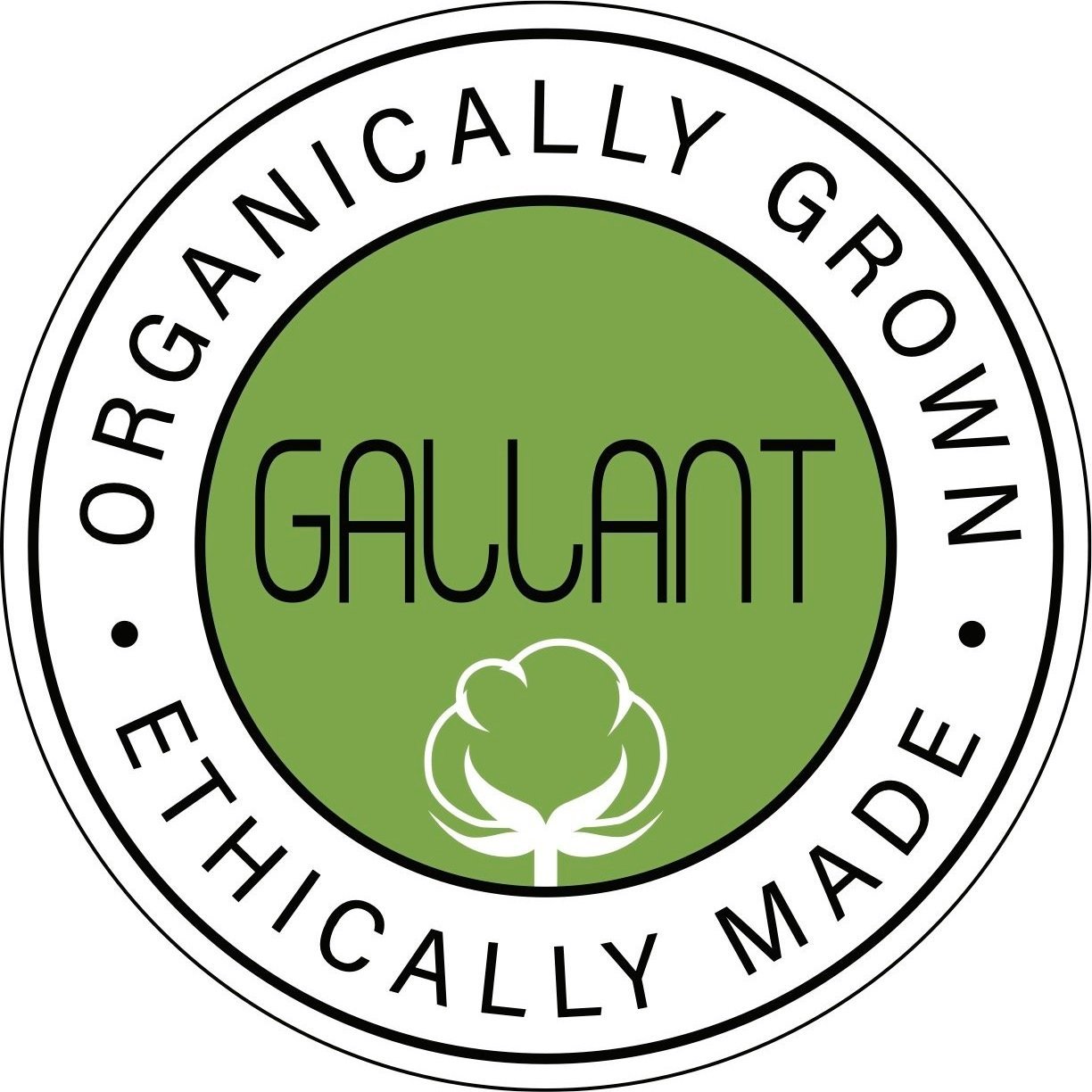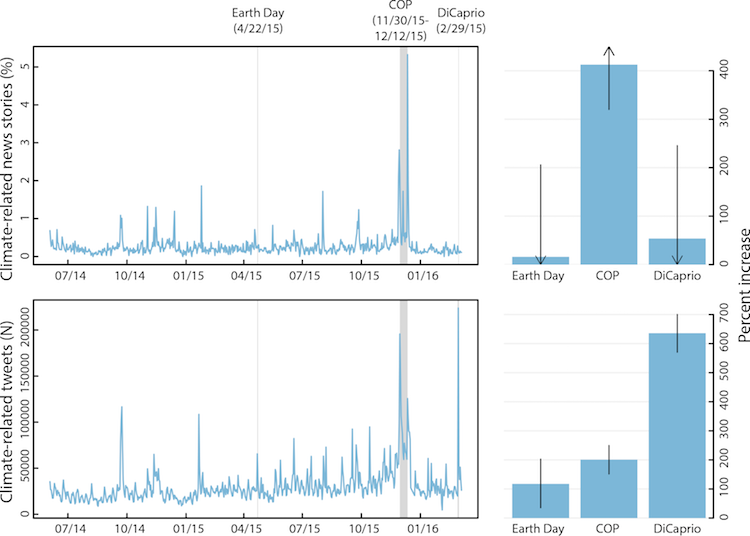Leonardo Dicaprio’s Vision to Fight the Climate Epidemic.
Climate change is real. It is happening right now. Leonardo Dicaprio has the vision to fight this problem.
While accepting an Oscar award for Best Actor for his performance in the Revenant in 2016, Leonardo DiCaprio addressed his audience, the ones who were attending the ceremony and 34.5 million people who were viewing it at home by saying, “Climate change is real. It is happening right now, it is the most urgent threat facing our entire species, and we need to work collectively together and stop procrastinating”. His speech may not have received massive media coverage but it did affect the way people tweeted, Google searched and engaged online. A research article showed that the tweets that contained the phrases “climate change” or ‘global warming”, “were at the highest recorded value […] with more than 250,000 tweets on that day” and “third-highest point ever recorded for climate change or global warming on Google trends” after his speech. This goes to show that when celebrities talk about climate crisis and social issues it has an impact on how we engage online. Leo has not only used his platform as an actor to bring awareness about climate change. He has also been working as an environmentalist to raise issues about the causes, contributions, and solutions of climate change.
On his social media pages including Twitter (19.1 million followers), Facebook (16.5 million followers) and Instagram (32.5 million followers) he shares news, articles, and statistics about climate change including wildfires in California, oil drilling in Ecuador, rubbish dumping in India, and the decimated population of Bornean orangutans in Indonesia. Moreover, Leo works with organizations, governments, brands, and other celebrities to make sure that climate change is taken seriously and we are doing everything we are capable of doing to fight the climate crisis we are facing around the globe. In September 2014, United Nations then Secretary-General Ban Ki-moon designated Leo as a United Nations Messenger of Peace with a special focus on climate change. In 2016, he was awarded a Crystal Award by the World Economic Forum and the same year he also joined the Global Citizen Festival. He also produced the movie Before the Flood with National Geographic. For the movie, Leo travelled to five continents and the Arctic to witness climate change, he went on expeditions to uncover the reality of climate change and meet with political leaders fighting against inaction, and he discovered a calculated disinformation campaign organized by powerful special interests working to confuse the public about the urgency of the growing climate change. Carbon emissions created from the movie were later offset. This July (2019), he launched the organization Earth Alliance, with Laurene Powell Jobs to help address urgent threats to Earth’s life support systems. The organization was launched in response to the growing climate crisis and staggering loss of biodiversity threatening the stability of life on earth.
Leo’s work to fight climate crisis and protect Earth and its wildlife is not new. His organization, Leonardo DiCaprio Foundation (LDF) was founded in 1998. Since its foundation, LDF has awarded $100 million grants and funded more than 200 projects. They support, “… projects around the world that build climate resiliency, protect vulnerable wildlife, and restore balance to threatened ecosystems and communities”.
Their program has six focus areas:
Wildlife and Landscapes
Marine Life and Oceans
Climate Change
Media, Science & Technology
Environment Now California Program
Indigenous Rights
Wildlife and Landscapes:
1/3 of amphibian species are at risk
According to Landsat Science (NASA), more than half a million square miles of new farmland (roughly the size of Alaska) was created in developing world between 1980 and 2000, of which over 80% were carved out of tropical forests sending more carbon into atmosphere and driving global warming. Today 1/3 of amphibian species are at risk and the leading threat factors include habitat loss, disease, invasive species, overexploitation and chemical pollution. By 2003, an estimated of 67,764 square kilometers of rainforest in the state of Rondônia in western Brazil, once home to 208,000 square kilometers, had been cleared. Forests in the Americas, Africa, Southeast Asia have been disappearing for human food production leading to devastating consequences including social conflict and human rights abuses, extinction of plants and animals, and climate change.
LDF supports, “… efforts on the ground where organizations are working closely with local and indigenous communities and governments to build successful, long-term solutions that both protect natural habitat and improve the lives of the people that live there”. A few of their projects include:
Protecting Wild Tigers in Nepal - Since 2010, they have been working with World Wildlife Fund’s tiger conservation in the Terai Arc of Nepal. Through community driven conservation activities and restoration efforts, tiger numbers have more than doubled and poaching incidents of tigers and rhinos are at a record low.
Borneo Nature Foundation: Protecting Borneo’s biodiversity - They are supporting the Borneo Nature Foundation to address the causes of fires in, “… Sebangau National Park by restoring drained and deforested peatlands and encouraging behavior change amongst local communities…”.
Other projects include Supporting Grassroots Conservationists, Protecting the Giant Sequoia National Monume, and more.
Marine Life and Oceans:
The ocean absorbs 30 percent of carbon dioxide produced by humans
The oceans contain 99 percent of the living space on the planet. Over 3 billion people depend on marine and coastal biodiversity for their livelihoods while marine fisheries directly or indirectly employ over 200 million people. According to the United Nations Development Programme (UNDP), 40% of the ocean is heavily affected by pollution, depleted fishers, loss of coastal habitats and other human activities, while, the ocean absorbs 30 percent of carbon dioxide produced by humans, buffering the impacts of global warming. Human activities affect all parts of the ocean whether it is because of the lost and discarded fishing nets, or ships spill oil and garbage especially plastic, it is putting marine life and oceans in danger.
“LDF is accelerating efforts to protect 30% of the world’s oceans by 2030 through the creation and expansion of marine protected areas (MPA). MPAs allow fish populations to rebound and increase the resilience of marine ecosystems, acting as a buffer against the damaging effects of climate change”. Projects include:
Ocean 5: An International funder’s collaborative comprised of new and experienced philanthropists dedicated to protecting the world’s five oceans. This project makes grants, leverages matching grants, provides in-kind services, and shares strategic guidance in an effort to constrain overfishing and create and expand marine protected areas.
Shark Conservation Fund (SCF): SCT is focused on halting the overexploitation of the world’s sharks and rays, reversing declines, restoring populations, and preventing extinctions. It has funded projects in more than 30 countries including Liberia, Pakistan, Malaysia, Peru and more.
Other projects including Save Our Wild Oceans, Water Defense, Securing Chilean Waters for Sharks and more.
Climate Change:
2014-2018 were warmest years ever recorded in the 139 years
We have all read or heard about the evidence of climate change including the rise of the Earth’s temperature, warming oceans, shrinking ice sheets, glacial retreat, decreased snow cover, rise in sea level, extreme events, and more. Earth’s average surface temperature has risen about 1.62 degrees Fahrenheit since the late 19th century, a change according to NASA largely driven by increased carbon dioxide and other human-made emissions into the atmosphere. Additionally, the amount of carbon dioxide absorbed by the upper layer of the oceans is increasing by about 2 billion tons per year. 97% of climate scientists agree that climate – warming trends over the past century are extremely likely due to human activities. Last five years, 2014-2018, were the warmest years ever recorded in the 139 years.
Leo’s organization, “LDF’s climate program is built on strategy of action that accelerates the best solutions to climate change, like the global transition to 100% renewable energy by 2050”. They also prioritize implementing natural climate solutions that serve an important role in both climate change mitigation as well as adaptation. Some of their projects to fight climate change include:
The One Earth Climate Model: A collaboration between the University of Technology Sydney (UTS), the German Aerospace Center (DLR), and the University of Melbourne (UM) will develop a series of advanced regional decarbonization pathways that could limit global warming to 1.5˚C.
R20 Regions of Climate Action: LDF works with R20 Regions of Climate Action (R20), an non-profit organization whose mission is to support and empower subnational governments and communities in the identification, preparation and financing of bankable renewable energy and other green infrastructure projects such as energy, waste, water and transport.
Other projects include Empowering Communities with Solar Energy, Fiji Rural Electrification Fund, Los Angeles Food Policy Council, and more.
Media, Science & Technology:
LDF’s Media, Science & Technology program seeks to answer the question, What is the world we want to see in 2050?, by partnering with many of the world’s leading scientists, think tanks, and NGOs to develop a new vision for the future, one in which humanity and the natural world coexist in harmony.
Environment Now California Program:
LDF’s Environment Now California Program is focused on supporting local efforts to protect forests, coastal zones, and fresh water ecosystems as well as efforts to create a fully sustainable food infrastructure system.
Indigenous Rights:
Indigenous peoples inhabit 80% of the world’s intact forests and high biodiversity ecosystems. LDF supports indigenous communities who are on the front lines defending their lands, water, people and culture from mounting pressures. Around the world, the seizure of land for fossil fuel extraction and oil pipelines, and the clearing of forests for the exploitation of resources like timber, minerals and palm oil not only impacts the planet’s ecosystems -- it also ravages countless indigenous and local communities. LDF funds indigenous led programs that teach local leaders how to map and document their territories, defend their indigenous rights, implement renewable energy solutions, develop sustainable livelihoods, and increase the impact of their public advocacy efforts.
Although Leo has a bigger platform than most of us, being a renowned (and loved) actor and founder of a major non-profit, it is critical to understand that every action we take at home, work or in public everyday affects the Earth. We ourselves need to take a stand and use our own platform to raise awareness about the climate crisis and its solution. Start small and start at home. Try being a vegetarian one day a week or eat less carbon intensive meats (replacing all beef consumption with chicken for one year leads to an annual carbon footprint reduction of 882 pounds CO2e). If you have a backyard, grow some vegetables, herbs or fruits. Compost. If you are thinking about buying a car, buy a hybrid or electric car if your budget allows it. If you’re thinking about renovating your house, add solar panels. Plant trees. Recycle. Reuse. Carpool or use public transportation when you can. Use a reusable water bottle and coffee mug. Carry reusable tote bags when shopping. Avoid using plastic bags or single use items. There are a lot of things you can do to help fight change. Lastly and most importantly, spread the message. Make sure your friends, family, workers and community know that, “… [ Climate Change is] the most urgent threat facing our entire species, and we need to work collectively together and stop procrastinating.”
LDF has funded and has taken part in many projects to fight the climate change while partnering with many great organizations. We are also aware that LDF and Leo have faced criticisms including Leo’s lifestyle and not providing, “… financial statement disclosures that would help outside groups determine how efficiently the group was raising and spending its money”.
Reference:
https://www.leonardodicaprio.org/
journals.plos.org/plosone/article?id=10.1371/journal.pone.0159885
https://www.un.org/press/en/2014/note6421.doc.htm
https://www.weforum.org/agenda/2016/01/meet-the-davos-2016-crystal-award-winners/
https://www.beforetheflood.com/
https://landsat.gsfc.nasa.gov/most-new-farmland-comes-from-cutting-tropical-forest/
https://www.fs.usda.gov/ccrc/topics/wildlife
https://earthobservatory.nasa.gov/world-of-change/Deforestation
https://seawifs.gsfc.nasa.gov/OCEAN_PLANET/HTML/education_marine_life_factsheet.html
https://www.un.org/en/events/oceansday/background.shtml
https://climate.nasa.gov/evidence/
https://grist.org/article/what-has-leonardo-dicaprio-done-for-climate-change-grist-investigates/

